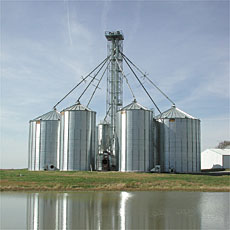 IN the absence of planning for maximisation of crops and low spending of allocated funds for construction of modern storage facilities, Sindh faces a threat of becoming a food insecure province.
IN the absence of planning for maximisation of crops and low spending of allocated funds for construction of modern storage facilities, Sindh faces a threat of becoming a food insecure province.
The present population of around 40 million of the province is likely to double by 2030. This rapid increase in population during the next 20 years would need doubling the present production of all crops, particularly wheat, rice and sugarcane to meet the mounting food needs.
Only about 10 per cent of this enormous requirement will come from increase in acreage, while the rest 90 per cent will have to be met by augmenting crop production. This will need an enormous investment for maximisation of per acre yield through provision of good quality seeds, promotion of better land management and improved farm practices and, most importantly, a modern storage infra structure to protect and save the produce.
A review of different official budgetary and planning documents points to a grim situation and the likelihood of emergence of food insecurity in the province, as the government lacks planning to ensure food availability to people in the coming years.
Given the situation, encouraging farmers to grow more crops will not protect the province against food insecurity. In this regard, investment in building modern storage facilities/silos is equally important.
Agriculturists put post-harvest losses of different crops at 40-45 per cent including those caused by inadequate storage facilities. Tons of grains including wheat and rice are spoiled every year owing to rains and erratic weather conditions as well as sizzling heat wave, which can be avoided by keeping grains protected in silos.
Rain damage: This time again the recent rains in different districts of Sindh have damaged a large quantity of procured wheat as it was lying in the open at different pro curement centres and privately-rented godowns, many without roof.
The current province-wide post-rain losses are estimated at around Rs390 million as when it rained in Sindh, more or less six million wheat bags were lying in the open due to inadequate storage facilities, according to food department reports.
The provincial food department achieved the target of 1.5 million tons of wheat (15 million wheat bags) during the current wheat procurement drive. But, only seven million bags could be stored in government and privatelyrented godowns while the rest of the stock was left lying in the open at different procurement centres, according to reports from different district food officials. “As many as two million of the seven million wheat bags have been kept in private godowns,” they said.
Although, food department director Aftab Memon puts the figure of damaged wheat bags at 1,80,000, the actual figure is far more in view of the overall number of wheat bags that were lying in the open when it rained heavily.
Badin, Thatta, Hyderabad, Tando Allahyar, Tando Adam, Sanghar, Khairpur, Sukkur Dadu, Larkana, QambarShahdadkot and Shikarpur received heavy rains, where a large number of wheat bags were lying exposed in the open.
Heavy monsoon rains are expected in July and August in southern part of the country. The tons of recently procured wheat might get lost if measures were not taken for its safe storage.
Despite the prediction, unfortunately there seems to be no action plan in the offing by the provincial food department for the safety of the procured wheat that is lying in the open in many parts of the province.
When this scribe talked to the food department officials whether they had any plan for the protection of wheat bags, they said that they were yet to come up with a contingency plan in this regard.
Risk in polymer bags: On the other hand, another large quantity of wheat stored in privately-rented godowns in different wheat growing districts, has started decompos ing and becoming prone to insects and moths attacks as thousands of polymer bags packed with wheat are getting damaged, according to reports collected by this scribe.
Provincial food department’s inaction for safekeeping of wheat stocks still lying in open at different procurement centres is bound to cause huge losses to the provincial exchequer.
Provincial food secretary Naveed K. Baloch claimed that all-out efforts were being made to avoid further damage to the remaining wheat stock. He admitted that polymer bags were not suitable for grain storage and were prone to damage within a month. “Yet, the government was compelled to pack wheat in polymer bags this time, because of serious shortfall of gunny bags,” said Mr Baloch.
A food official said that the food department was provided with less than 50 per cent of its requirement of gunny bags for procurement of wheat. The remaining 50 per cent of the 1.5 million tons of wheat was packed in polymer bags.
The provincial government may incur heavy losses, if the authorities concerned do not act immediately to protect the hitherto safe grain lying in the open, it is feared.
Lack of investment and poor utilisation of allocated funds for proper rehabilitation of the existing storage facilities and building of modern silos, will continue to cause financial losses to the government.
The government pays around Rs40-45 million annually as rent of godowns to private parties for storage of wheat.
Availability of improved and modern silos to store and protect grain always pays off while their absence adds to shortage and increase in cost of grain. Research findings have concluded that better storage facilities help maintain food prices and prevent loss of grain and consequently hunger and famine. Poor storage system is often to be blamed for food insecurity.
There is an urgent need to plan for building modern silos to help reduce province’s postharvest losses and it is only possible through hefty allocations for the construction of modern storage facilities.







